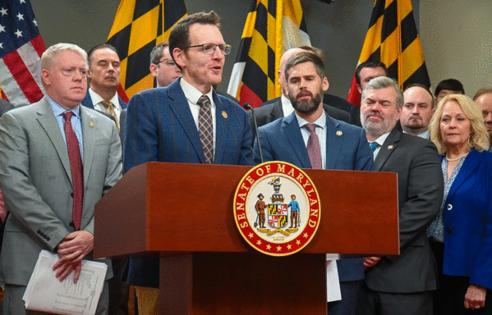Trump unity strong among Maryland Republicans. Will 2026 add pressure?
Published in Political News
BALTIMORE — Maryland’s elected Republicans are unified in their support for President Donald Trump after his first 100 days, saying that his policies will benefit the state.
“I think, generally, we’ve all been supportive of President Trump’s agenda,” Senate Minority Whip Justin Ready, a representative of Frederick and Carroll counties, said Friday. “President Trump is doing everything he said he would do.”
But political scientists say that, as Maryland approaches the 2026 midterm election, unified support could begin to splinter as lawmakers distance themselves from Trump to curry favor with voters in deep blue Maryland.
“Maryland, as we know, is not necessarily the United States. It is a reliably Democratic state,” said Todd Eberly, a political science professor at St. Mary’s College of Maryland. “Republicans are vastly outnumbered in the General Assembly, and, as I tell my students, the number one objective of people in office is to get elected and remain in office.”
“Political reality does start to lay in” when looking to the next election cycle, he said.
‘Prioritizing America first’
Because they represent a tiny portion of the legislature, unity among the minority party in Annapolis is key.
In Maryland, Democratic voters outnumber Republicans 2 to 1. There are 188 legislators in the Maryland General Assembly. With only 39 Republicans in the House and 13 in the Senate, the GOP’s impact in Annapolis is small.
While Maryland Democrats in both the General Assembly and congressional delegation lamented actions taken by the president and his administration as he worked toward his 100-day milestone, Republicans celebrated what they described as popular, commonsense policy.
In a statement issued Wednesday, the Maryland Freedom Caucus, a faction of seven members of the House of Delegates, “applauded” the president for the “decisive” actions he took in his first 100 days in office.
“His leadership has focused on prioritizing American interests, ensuring long-term economic stability, and safeguarding individual freedoms,” the caucus said. “These achievements in the first 100 days reflect President Trump’s dedication to prioritizing America First.”
The Maryland Freedom Caucus specifically highlighted Trump’s immigration policy, which they said “have resulted in the lowest levels of illegal border crossings in our lifetime.”
According to a tracker of southwest land border encounters from U.S. Customs and Border Protection, there were 84,174 interactions between border patrol officers and immigrants from January to March 2025, compared to 555,467 during the same period in 2024 when President Joe Biden was in office.
Ready lauded Trump’s attempts to eradicate waste, fraud and abuse through the work of Elon Musk and the Department of Government Efficiency.
“Nobody in their right mind should argue that the federal government didn’t need a scrubbing or a retrenchment,” he said. “Just like a business, any government entity … has to, from time to time, evaluate where we are.”
Del. Kathy Szeliga, a Baltimore County Republican and Freedom Caucus member, said that the president “is championing” policies that “average Americans support.”
“We really have a lot of mainstream ideas, and it’s the radical liberals in Annapolis that are out of the mainstream,” she said.
‘Turn the state around’
During the 2025 legislative session, the formation of the Maryland Freedom Caucus, a group of seven of the most active members of the legislative GOP, caused a perceived schism among Republicans in the House of Delegates.
Some have chalked it up to a difference in strategy — the small sect more publicly and aggressively pursues policy than their colleagues.
In a mid-March interview, House Minority Leader Jason Buckel, an Allegany County Republican, called the caucus members “extremely online.”
The Freedom Caucus has a very active platform on X, which, at times, has caught the attention of Libs of TikTok — a popular anti-LGBTQ+ social media account.
Though the strategy differs, Buckel said the Republican Party would persist as long as they work toward the “same ends and goals — which, I think, we are.”
And they did. This session, Republicans in both chambers stood unified in their fight against proposals for new and increased taxes, immigration and public safety policy, climate-friendly energy legislation and Maryland’s reliance on the federal government to power its economy.
Maryland’s economy is closely tied to the federal government, largely due to its proximity to Washington, D.C., and the 260,000 federal workers who reside in the state. It also relies heavily on the federal government for funding, especially for social safety net programming like Medicaid.
To Ready, the focus of Republicans in the legislature is to make the state less dependent on the federal government, so that the effect isn’t felt as harshly when cuts and layoffs happen as they are under Trump.
“Our focus is really on trying to turn the state around from where we are now, which is a very troubled state economy, and it’s a state that’s too heavily dependent on the federal government, too heavily dependent on government spending, in general,” and is losing business, he said.
Still, Eberley cautioned that the unity around Trump may dissipate as Republicans start to make their reelection bids and look forward to meaningful ways to impact policy among the Annapolis Democratic supermajority.
“… The Trumpier you are, the less likely you are to have a seat at the table,” he said.
But Del. Matt Morgan, a St. Mary’s County Republican and the chair of the Maryland Freedom Caucus, said that politicians who stay true to their policy convictions shouldn’t worry.
“Cowardice is contagious, but so is courage,” said Morgan. So, when you get up and speak on issues that impact the people of Maryland, “I’m telling you they’re going to reward you.”
---------------
©2025 The Baltimore Sun. Visit at baltimoresun.com. Distributed by Tribune Content Agency, LLC.




























































Comments